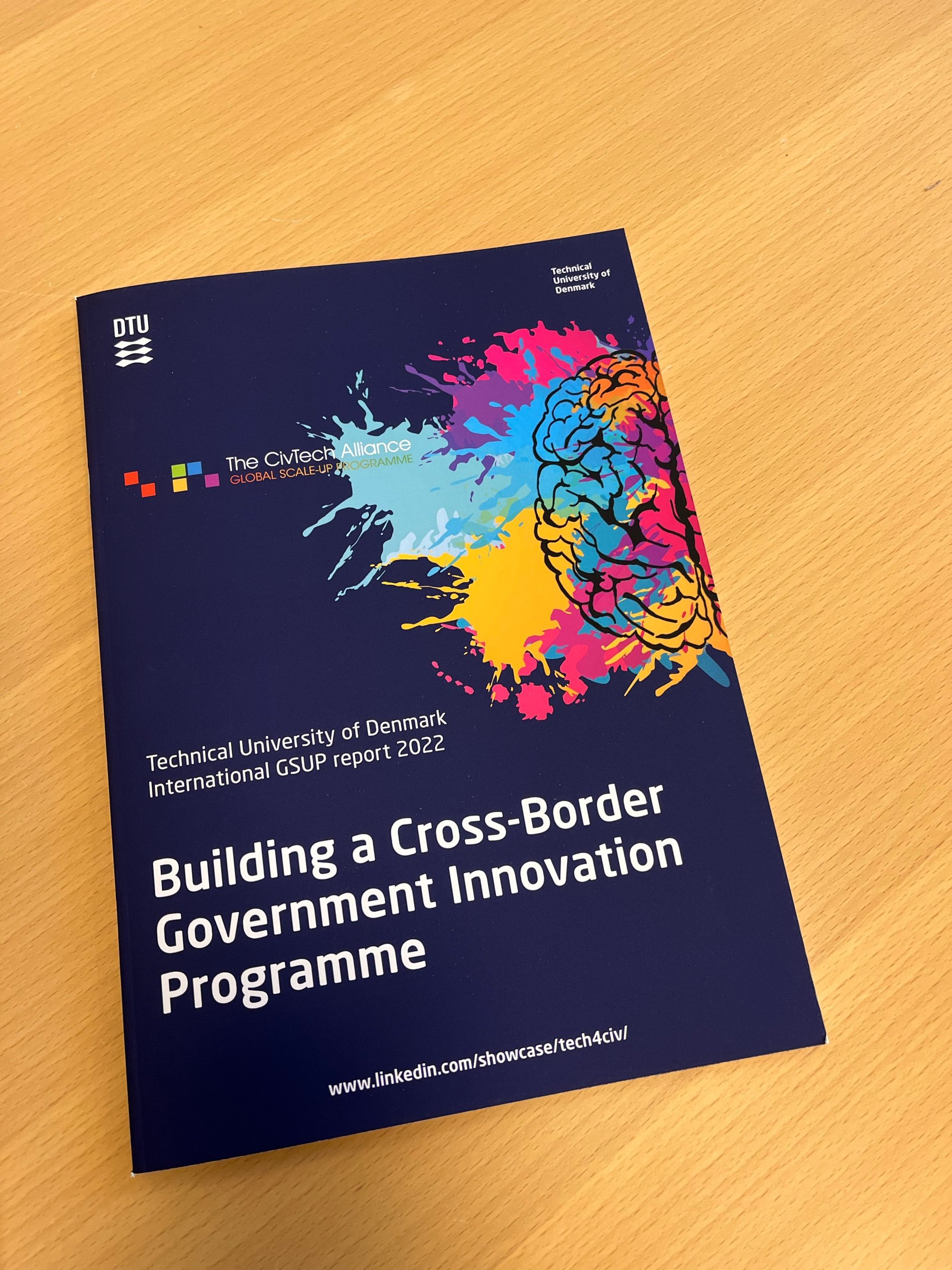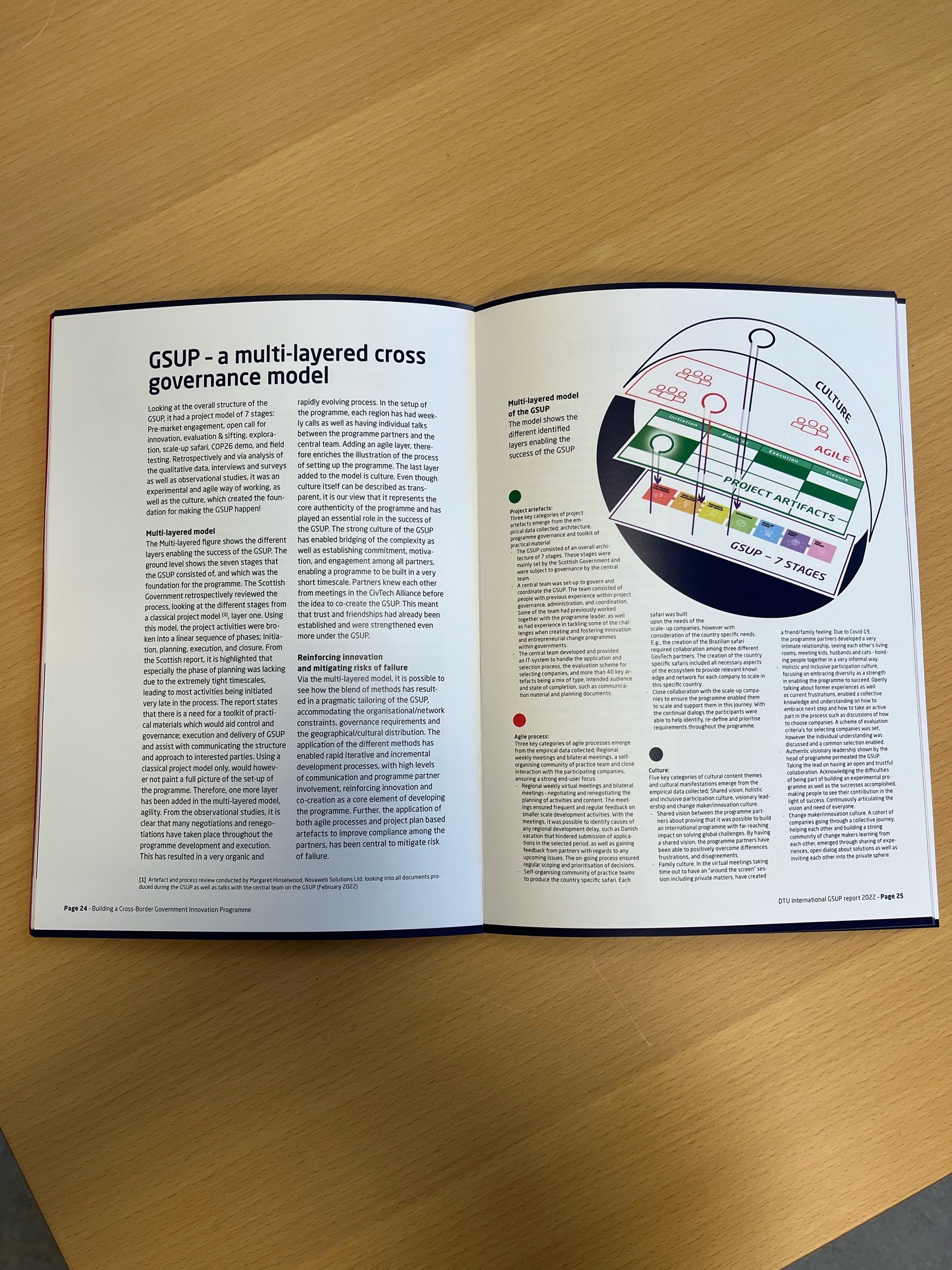





In August 2022, the Technical University of Denmark (DTU) published their report on The GovTech Global Alliance’s Global Scale-Up Programme. The forum for this was the opening of the Scottish Government’s Nordic Hub in Copenhagen, by First Minister Nicola Sturgeon MSP. Accompanying Anders Barklev (President of DTU), were Carsten Gaarn-Larsen (Senior VP) and authors Jan Madsen (Director DTU Compute) and Mie Weile (Deputy Director DTU Compute)
Introduction to the report
‘Technology for people’ is the overall strategy of the Technical University of Denmark (DTU). In 2020, the World University Research Rankings, ranked DTU second in the world (after MIT) and number one in Europe, assessing universities for both impact and excellence, as well as the ability to collaborate internationally with businesses and across disciplines.
The Tech4Civ strategy - Tech4Civ is DTU’s vision for ensuring inclusive, democratic, and open societies by empowering citizens to understand and engage in the digital transformation and its impact for society. Through a novel approach combining research, competence development, scientific advisory, and innovation initiatives, DTU wishes to drive the development of a digital mindset ensuring that contemporary laws and new tech solutions are co-created, based on a sustainable and ethical understanding. With the Tech4Civ strategy, DTU invites all sectors to be part of fostering new ecosystems – where solutions to problems of the future are multi-stakeholder endeavours.
Research in progress - The Tech4Civ research group is established at DTU Compute and supported by a network of international top researchers and leading professionals within the areas of digitalisation, leadership, organisational change, and innovation. Our mission is to make research on digital transformation and innovation in public organisations accessible and comprehensive, and to bring it closer to practice by co-creating and transferring knowledge to public and private organisations, inspiring them to take action.
We want to understand how digital competencies can be used to accelerate innovation in public organisations, and to use this knowledge to create methods, programmes, and tools to support the process. We attempt with this report to understand and explain the complex world of cross-border and intergovernmental collaboration. We believe that it is important to undertake this type of research to gain insights into the desired competencies of running this new type of programme. We want to ensure that the lessons learned are shared widely, with the aim to develop a methodology to create future programmes to solve global challenges in a cross-national way.
The research on the Global Scale-Up Programme and the summary findings were presented at COP26, DIGITExpo 2021, the CivTech® Demo Day 2022 and compiled into this report for the benefit of researchers and governments interested in intergovernmental collaboration and businesses interested in participating in future programmes.
Structure & Methodology
The report is introduced with a preface from the Minister of Business, Trade, Tourism and Enterprise, Ivan McKee MSP, Scottish Government and Alexander Holt, Scottish Government, architect and founder of the Global Scale-Up Programme (GSUP). The report contains six chapters: an introduction to the programme, partners, and participating companies, three chosen themes, four stories and ending with the impact of the programme. In the themes, we provide findings from the qualitative interviews, and results from the quantitative surveys held with programme partners and participating companies. In addition, observational studies from being an active participant of the programme are integrated into the findings.
Each chapter gives a summary of recommendations. In chapter one, we address the question of why programme partners and companies participate in the GSUP. Chapter two investigates what it takes to build cross-border governance bodies, including the experiences of developing and building the GSUP as a shared journey among the twelve programme partners. The chapter investigates both the challenges and the potential opportunities and benefits in creating cross-governmental programmes.
We attempt to derive some general takeaways and lessons learned, as well as why it is important to have all sectors involved. Chapter three provides an overview of what competencies are needed to drive an intergovernmental scale-up programme like the GSUP. In this chapter, we examine what competencies the different programme partners see as essential for taking part in and driving a programme like the GSUP. We also shed light on the perspectives looking at it from the participating companies’ point of view.
In chapter four we give the programme partners and participating companies the word, broadening the scope of the report by enriching the experiences of participating and being part of the journey from the point of view of those who lived it. With these stories, we hope to give the reader a glimpse of how it felt to be part of the GSUP as well as give the programme partners and participating companies the opportunity to tell their individual stories.
Chapter five investigates the expectations and impact of the GSUP and summarises the previous chapters looking into how the GSUP can become a blueprint for future cross-border government innovation. Finally, we put things in perspective with words by President of DTU Anders Bjarklev.
The report hereby provides unique insights from the different stakeholders giving a multifaceted view on the programme.
